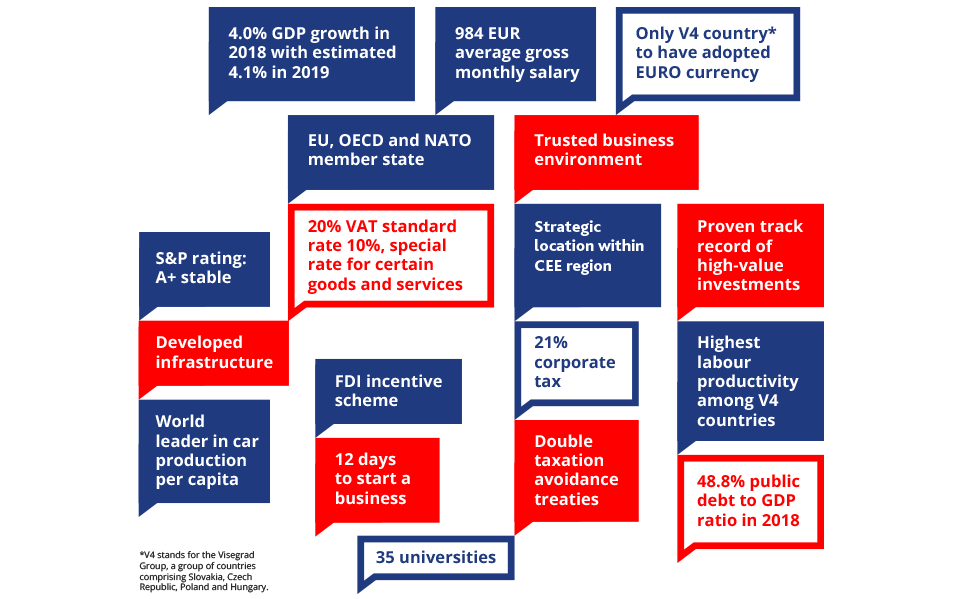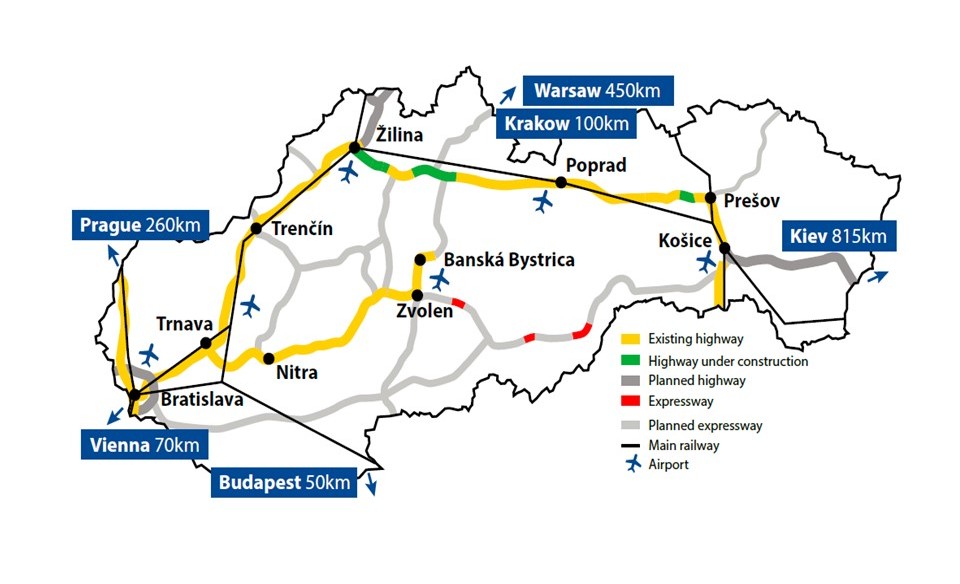Business lounch in Slovakia
Do you need an assistance with variety of issues such as starting a business, JV, M&A, or finding a business partner in Slovakia? Our members and partners provide a comprehensive support and services to deal with all issues related to your business lounch in Slovakia.
The Slovak Republic is undoubtedly one of the most attractive investment destinations in Europe. Once nicknamed the Tatra Tiger, Slovakia reaps the benefits of strong underlying fundamentals, such as its highly skilled and educated workforce, well-developed infrastructure and political stability.

DID YOU KNOW?
In the Slovak Republic foreign and domestic investors may receive four different types of investment incentives, such as cash grant, corporate tax relief, transfer of property at lower than market prices and contributions with new jobs.
GENERAL
Official name: Slovak Republic
Area: 49,036 km2
Time zone: GMT + 1
Currency: EUR
Official language: Slovak
PEOPLE
Population: 5,419 million
Active workforce: 2,731 million
Birth rate: 1.03 per 1,000 people per year
Average gross monthly salary: 944 EUR
Retirement age: 62 years
INTERNATIONAL ORGANIZATIONS MEMBERSHIP
European Union
Euro Area
Schengen Area
V4
OECD
WTO
NATO, and others.
POLITICAL SITUATION
Type of government: Parliamentary democracy
Electoral system: Proportional representation
The Slovak Republic is situated in Central Europe, bordered by five countries – Hungary, Ukraine, Poland, Austria and the Czech Republic. Slovak cities are in close proximity to other internationally recognised hubs, such as Vienna, Budapest, Prague or Krakow, which only further underlines the favourability of the central location, offering access to 350 million customers within a 1,000 km radius. It is easily accessible by air, having two main international airports in Bratislava and Košice and another three global hubs in Vienna and Budapest accessible within two hours and Prague within four hours of the capital city.

DID YOU KNOW?
There are extreme requirements on candidates’ profiles nowadays. The expectation is: super-qualified candidate with excellent CV and experience too and also with a minimum salary requirement. Unfortunately, this is not a reflection of today’s reality.
- Comprehensive structural reforms of the tax, labour, pensions and healthcare systems and an overall decentralization of powers in past years.
- Membership in the Eurozone since 2009.
- One of the strongest recoveries in terms of GDP growth in the regions after the 2008 crisis.
- Higher levels of unemployment as compared to the situation in the Eurozone which indicates a potential for growth without the upward pressure on wages.
Ease of doing business
Based on the World Bank report on the ease of business, in 2018, Slovakia ranked number 39 in the world. In terms of comparable countries in the region, this year it was only surpassed by Poland. Slovakia was the regional leader in the ranking in years 2008 to 2013. The factors considered by the World Bank as measures of the index include:
- the political and institutional environment,
- macroeconomic stability, market potential,
- private entrepreneurship support,
- taxation system,
- access to financing, contract enforcement,
- the starting and closing of a business,
- labour market characteristics, and
- infrastructure quality.
DID YOU KNOW?
Slovakia and the CEE region offer foreign companies a number of advantages. Development of business relationships within the European Union are easy due the close geographical proximity, with good access through a number of budget airlines, meaning business here is especially ideal for SMEs on tight budgets. The European Union funded infrastructure, energy, and innovation projects have also created opportunities, and it currently has a far lower market penetration in comparison with West European markets. The Slovak workforce is highly skilled. The main foreign languages spoken are English and German. Hourly labour costs in Slovakia are more than 3 times lower than in Germany.
HUMAN CAPITAL
- A qualified and relatively inexpensive labour force is Slovakia’s greatest asset.
- The gross minimum wage is stipulated by the law, and translates to €2.8 per hour worked.
- The social security contributions by the employer amount to 35.2% with a cap for social contributions at a maximum base of €6,181.
- Slovakia is the regional leader (among V4 countries) in terms of labour productivity per hour worked.
Education
- In order to receive a high school diploma (so-called Maturita), there is a mandatory foreign language exam on the internationally recognised level B2.



